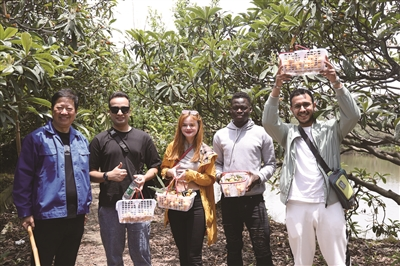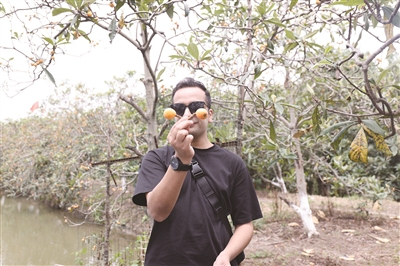An international expedition into the loquat season

Four expats in Hangzhou find it fascinating to learn about the different tastes of the various breeds. [Photo by Jin Yingying/Hangzhoufeel]

Patrick enjoys collecting loquats. [Photo/Hangzhoufeel]
The loquat season is back and Hangzhoufeel has invited four expats in Hangzhou for a full experience of collecting loquats from trees and learning about the different breeds and types of the fruit.
The destination is a loquat farm in the Tangqi town, which is known for producing superior loquats from the ancient time. Li Shizhen, the author of the renowned Compendium of Materia Medica (bencaogangmu/本草纲目), claimed that loquats from Tangqi are a step above all others. According to the book, loquats and its leaves can be used as herbs to ease sore throat and coughing.
It was a sunny morning as they arrived at the Chaoshan Cottage (超山农庄). Each was given a basket by the host, Mr. Shen Wanling, who led the team to his own farm. He stopped by a particular tree and started to demonstrate the techniques of collecting loquats. "You must break off the branch instead of the fruits," he said while snapping one loquat branch with a cluster of fruits and as a control a single fruit, "if you pick the single fruit, the sugary juice will leak from this hole at its end connecting to the branch."
That particular tree is of an excellent trait termed the White Sand Loquat (白沙) for it is whiter than the other traits and is softer and juicier. Mr. Shen deliberately picked another loquat by the branch and pointed to the green spots on the fruit skin to the four expats saying that these can be an indication of the loquat being sour and tart. The expedition continued when the group threaded across a peaceful pond through the narrow stone paths that are densely covered with bending branches, reaching to another tree that bears a slightly different kind of loquats.
This breed of loquat has softer-than-usual branches that can be bent with a slight pull. Its fruits are much sweeter, said Shen, as he grabbed a branch by its end. He made a gesture to invite the group to climb up the tree seeking for the ripe fruits on themselves.
Taku, an international student from the Zhejiang University of Science and Technology, nimbly found his way up to the tree and stretched his arms across branches and leaves. So did Nahdi, a student at Hangzhou Normal University, who found himself a comfortable fork of the tree to foot himself while breaking off loquat branches. Nahdi almost immediately wanted to make a cup of juice with the loquats upon tasting it. He said with an imagining look on his face that the complex flavor of the fruit must be extremely wonderful for a cold summer drink.
For Patrick, a student learning pediatrician at the Zhejiang Chinese Medical University, found it especially fascinating to learn about the different tastes of the various breeds. He found the farm especially scenic and welcoming to amateurs like him. Miss Neli, a graduate student at Zhejiang University, was too busy taking photographs while her basket was filled up by the overwhelmingly hospitable Mr. Shen.
The group was invited into Mr. Shen's museum, the Jangnan Gaoban Museum, where his collection of cake and pastry molds are displayed. There are over 6,000 on display that are made in China, Germany and Japan. The team stood in awe as Mr. Shen explained how he managed to move the entire building to the present place and how the molds are used in different occasions in one's life – some cake molds are used on the celebrations for a new-born baby, some for an adolescent's 18th birthday when he or she becomes an adult, some for a wedding and some others even for a funeral.
By the time when the team left the cottage, each of them was given two baskets full of loquats by the generous Mr. Shen who extended a warm welcome to all the Hangzhoufeel readers who wish to visit and try out their own farm trip. The loquat season will end in another week. If you want to take a trip to the farm, try to go in the coming days. The group has summed up a tip for you: the small and ugly fruits actually taste perfect, while the big and puffy ones may make you frown for the sour and tart flavor.








